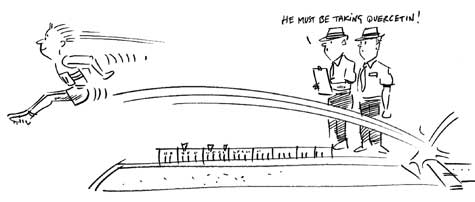|
|
|
Quercetin may boost mitochondrial function |
A study by researchers at the University of South Carolina's Arnold School of Public Health, led by Dr Mark Davis, shows that quercetin, the powerful antioxidant/anti-inflammatory compound found in fruits and vegetables significantly boosts endurance capacity and ‘maximal oxygen capacity’ (VO2max) in healthy, active but untrained men and women. The findings of the study, one of the first in humans to examine the energy-boosting effects of quercetin, are reported in the International Journal of Sports Nutrition and Exercise Metabolism, June 09.
Click here for more research reports First Published October 2009 |













